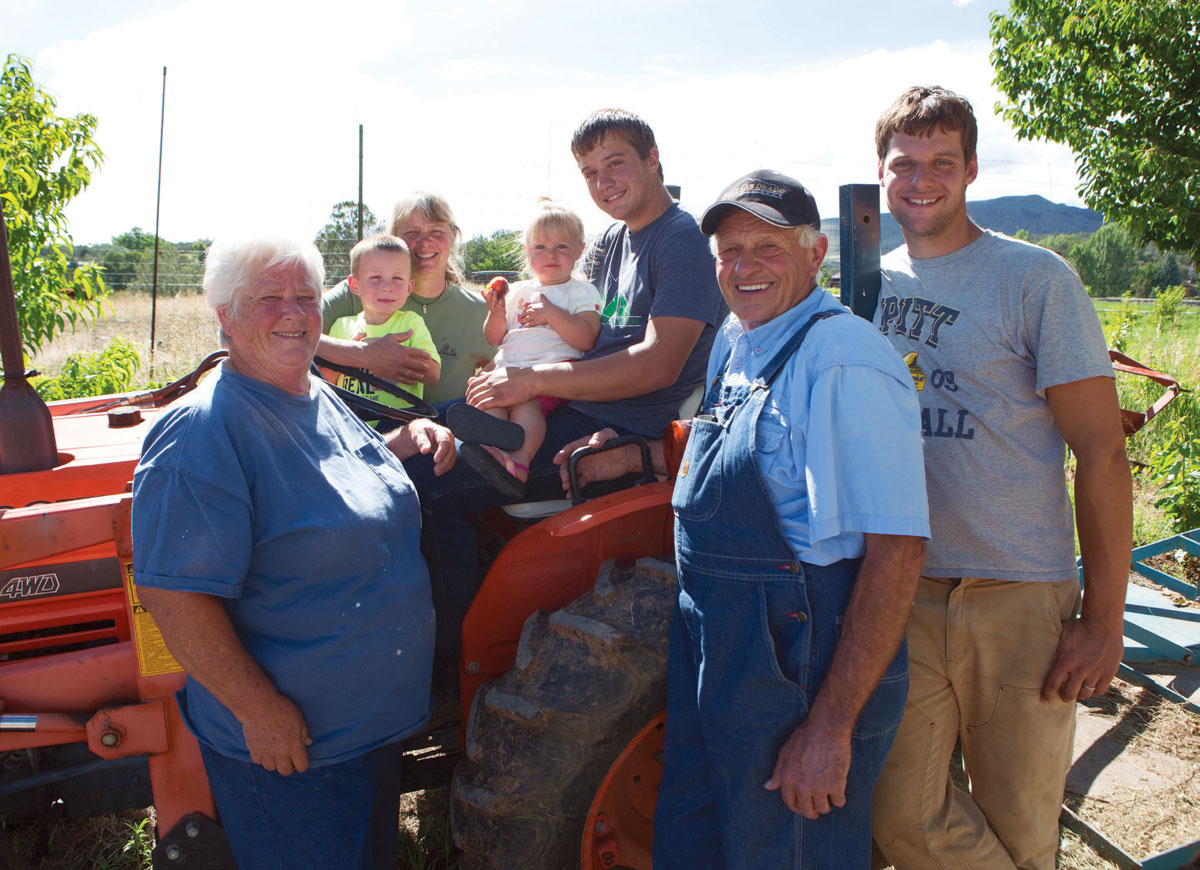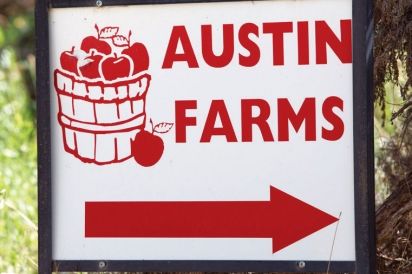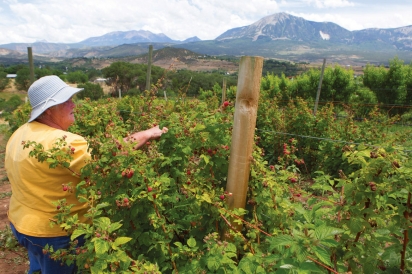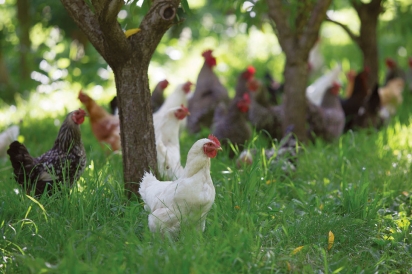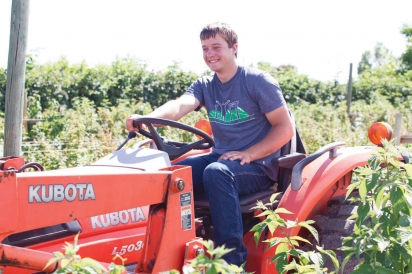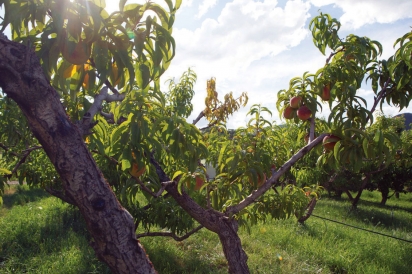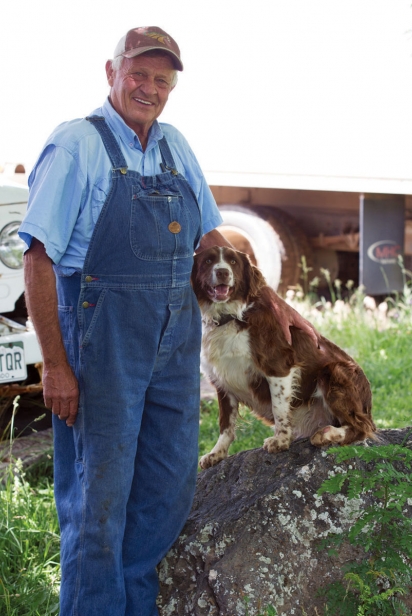All in the Family at The Austin Family Farm
Growing beyond organic at Austin Family Farm
A century ago, the United States was a predominantly agrarian nation, populated by multigenerational farmers and ranchers. Their ancestors had established homesteads across the country, and earned their living by selling cash crops, meat, milk, fiber and other goods. There aren’t many people today who can trace their agricultural roots back seven generations, while carrying on the family tradition.
For Glenn and Tony Austin of Paonia’s Austin Family Farm, however, farming is a legacy that began in the 1700s, when Glenn’s descendants were granted land in Tennessee after serving in the Revolutionary War. Glenn grew up on a tobacco and dairy farm in the northwestern part of the state, near the Kentucky border. His wife, Tony, was raised in the coal fields of West Virginia, but her family relocated to Tennessee and purchased a tobacco, corn and soybean farm when she was 15.
“I went kicking and screaming,” she recalls, “but two weeks in, you couldn’t have pulled me away with a tractor.” The two met that same year in high school and have been together ever since; this year marks their 55th wedding anniversary.
The couple moved to Colorado in 1970 with their three sons and a daughter, seeking “adventure and new opportunities.” Glenn had been working for Monsanto, doing field work and testing on Roundup, the widely used and increasingly controversial herbicide. His background in agricultural science, the work with a chemical company and experience teaching environmental science to middle schoolers in Paonia convinced Glenn to become an early adopter to the organic movement in the early 1970s.
After leasing land for a number of years, the Austins partnered with the late Jean VanDuzen in 1989 and purchased a 26-acre plot on Pitkin Mesa. Today, Austin Family Farm is known throughout Colorado for its high-quality, sustainably grown fruits, vegetables and honey. The farm used to be certified organic, but that became infeasible financially after Congress passed the Organic Standards Act in 2000. Today, they produce “naturally grown and sustainable” foods using practices that Glenn describes as “beyond organic.”
A Family Affair
Austin Family Farm is also very much a multi-generational business. At a time when the average age of the American farmer is getting older, it’s remarkable that two of four Austin children and three of 13 grandchildren (there are also five great-grandchildren and a number of former foster children) have chosen to stay in sleepy Paonia and work the land.
While 72-yearold Glenn oversees all of the farming, Tony performs “general labor—a lot of tilling and weed control, as well as berry a n d g r a p e production.” Daughter-in-law Casey does a little bit of everything, while daughter Tina Carney helps with the honey and chickens, which provide insect control.
Grandson Eric Carney, 19, assists with pruning, mowing and thinning. He and younger brother Clay started the farm’s honey business in 2008, with the help of cousin William. Last year, honey sales reached $50,000. Clay, who is just 18, is also a mechanic and certified welder. Clearly, these grandkids have farming in their blood. Even 22-month-old Brailee, who belongs to Glenn and Tony’s son David and his wife Casey, is proving true to her DNA. This summer, Brailee became the youngest and perhaps most enthusiastic berry picker in the family, showing a penchant for snacking on them that bodes well for a future on the farm.
The Austins never pressured their children into joining the family business. “We encouraged them to go out and experience life,” says Glenn, “and if they wanted to come back, great. It’s very gratifying to have them return and carry on a family tradition and operation.”
The Austins are genial, much-beloved members of the community, and always welcome help from neighbors. “We get kids who help out in summer so they can make money to go to camp,” Glenn explains. Education is another important component of the farm’s ethos, and Glenn leads tours in addition to hosting schools, universities and other groups.
Conventional to Conversion
The conversion to environmentally sound farming methods wasn’t as much of a stretch as one might think for a former Monsanto employee.
Says Glenn, “There was no such thing as ‘organic’ farming when we grew up. You grew ‘natural.’ Pesticides and herbicides didn’t become the norm until after World War II.”
“What made the biggest impression on me,” Tony says, “was a farm we saw here 45 years ago. They’d previously used chemicals, and I could still see how degraded the soil was. That showed me the lasting effects, so that when we started farming here it was with environmentally sound methods.”
The couple also found a mentor in the late Gilbert Wilson, a Paonia “organic farmer, fruit packer, scientist, environmentalist, inventor and true gentleman.”
“To have someone like that in the local organic movement was huge,” says Tony.
Over the decades, they have found effective ways to control pests like coddling moths and other insects. But it takes years of trial and error to discover what works, and there’s always the threat of new problems.
“I don’t like spraying produce—I’d rather stop any potential negative process when the trees and plants are in the dormant stage,” Glenn explains. “I give everything on the farm a shot of copper, sulfur and dormant oil, a petroleum-based product approved by USDA Organic, in the fall to help increase disease resistance, kill mildew and knock out problems. It helps put everything to bed, and I wake them up in the spring in the same way.”
Glenn adjusts soils all the time, amending with compost. “When I was in school, the emphasis was on chemicals,” he says, “but I’ve learned that soil health is the most important thing—granted, composting is also a chemical process.”
Stretching the Season
Paonia may be Colorado’s “banana belt,” but compared to more temperate parts of the country it’s still a limited growing season. The Austins cultivate 11 varieties of peaches, as well as cherries, plums, nectarines, apricots, grapes, raspberries, blackberries, potatoes and other root vegetables, cabbage, winter squash, 20 varieties of apples and an heirloom green bean called Mama Gatewood’s that’s been in Glenn’s family for over a century.
“I choose all my crops based on their hardiness—they’re of no value otherwise,” he says. “Then I look at flavor, and then aesthetics. If they don’t taste good, I can’t sell them.”
Quite a few of the apples are heirloom varieties, including one that came from Glenn’s fourth-grade teacher’s farm. “Anytime I see an old, neglected apple tree in winter, I try to get a cutting, then graft it and try it out, see if it works for us.”
Agriculture being the slow process it is, that can sometimes take years. “The only thing that happens quickly in farming is the stuff that goes wrong,” he says with a laugh. “You learn quickly from your mistakes. That said, I know less now than when I started! People say I’m an expert; I say I’m very experienced.”
Staggering planting and cultivating a mix of early- and late-ripening produce is also key to financial survival for a small family farm. “One of the reasons we grow grapes and berries is because they bloom late,” Glenn explains. “We also have varieties of peaches and potatoes that come into season in mid-October. With our apples, we have an early variety I developed called Austin Gold that comes out in July.” The name came about because a family friend remarked that an apple ripening that early is like “gold” to a farmer.
To Market, to Market
Glenn has, out of necessity, become a master at selling his harvest. After the Second World War, he explains, there was a big push to increase crop production, but farmers like Glenn weren’t taught how to sell their crops. They were packed and sold by someone else. “I tried to sell my produce in Aspen 45 years ago, and got run out of town because I didn’t have a license!”
He realized that small-scale farming was transitioning to a self-sufficient enterprise and joined the North American Farmers Direct Marketing Association. “I learned about marketing and applied those principles to my business. I also learned it’s a whole lot easier to give people what they want when you maintain control of your crops from start to finish.”
The Austins got their direct sales start at the Minturn farmers’ market 17 years ago; today they sell at markets and retail outlets from Colorado Springs to Crested Butte. Locally their produce and honey can be found at the Carbondale Community Food Co-op and select restaurants. They also have a thriving CSA with over 20 families who pick up their weekly boxes at various drop points in the Roaring Fork and North Fork Valleys. Last winter, Glenn and Tony took a vacation to visit a friend in Alaska and thoroughly enjoyed the trip, but travel and adventure isn’t on their bucket list. In fact, Glenn admits he doesn’t have a bucket list. “I’m doing what I want to do—it’s not work to me. Farming is a science and hard labor, but it’s also an art.”
Adds Tony as she tosses a ball to one of the farm dogs and watches Brailee toddle around the yard, “How do you retire from doing what you love the most?”
GO FIND IT!
Austin Family Farm 14741 Canyon Rd., Paonia 970.260.4298 AustinFamilyFarm.com


